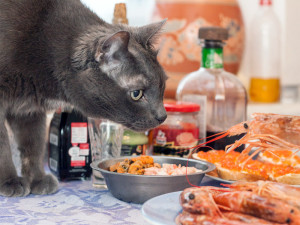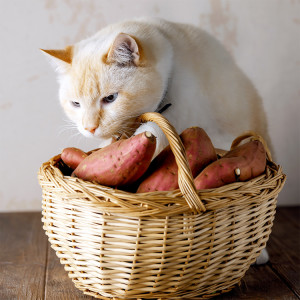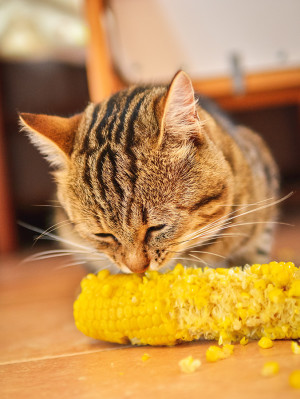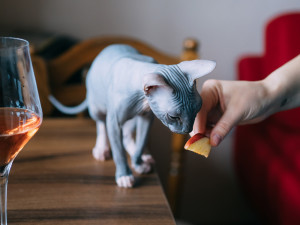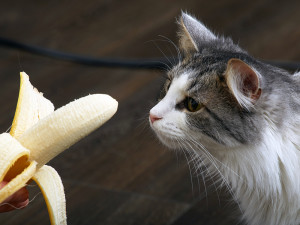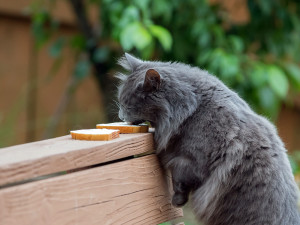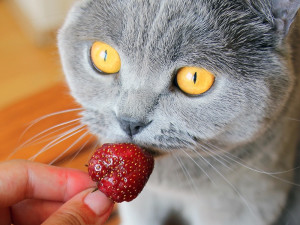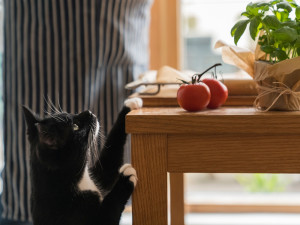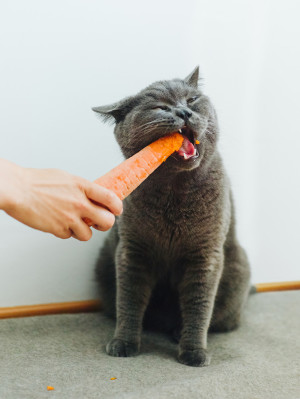Can Cats Eat Broccoli?
They shouldn’t share your broccoli cheddar soup, but...
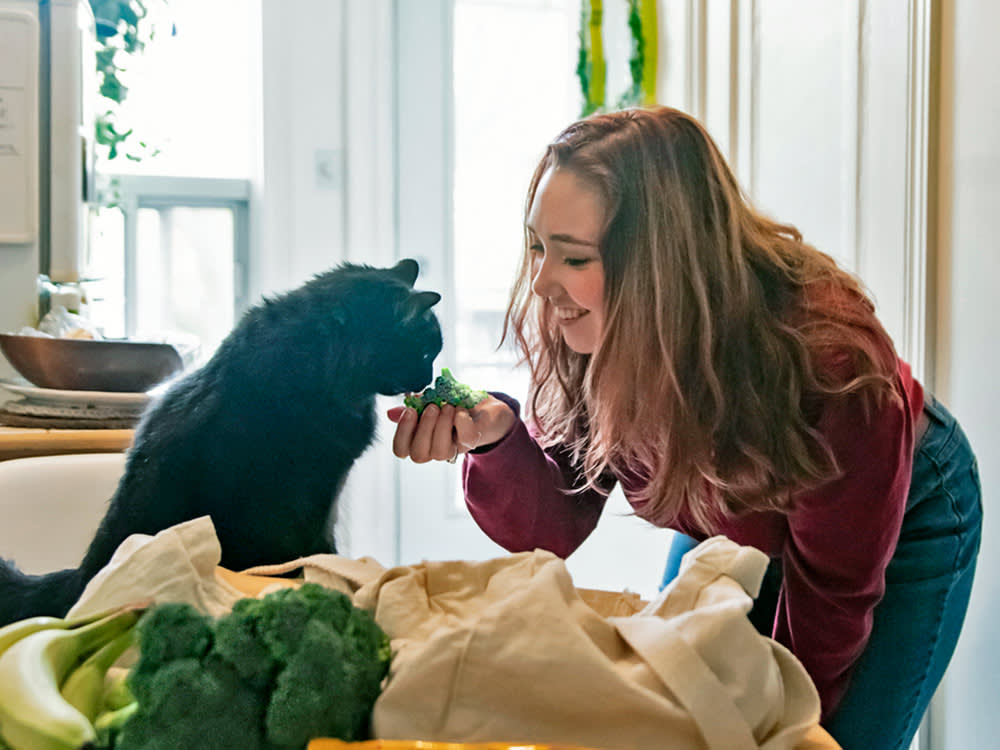
Share Article
Broccoli is a versatile vegetable that is touted as a superfood and can also be part of a decadent meal. Cooked into broccoli cheddar soup, crispy fried tempura, or even stir-fried with your favorite seasonings, broccoli can be delicious and nutritious for us, so why not share some with your cat?
Broccoli is nontoxic to cats and can be shared in small amounts, but read on to learn about why you’ll want to limit your cat’s broccoli intake.
Nutrition facts about broccoli for cats
Broccoli is a vegetable in the Brassica plant genus, which also includes many other cabbage-like vegetables, such as Brussels sprouts, cauliflower, some mustard plants, and of course, cabbage. We typically eat the crown of the broccoli, which is actually made up of tons of flower buds that are harvested before they bloom. The stalk and leaves of the plant are also edible.
Broccoli is considered a superfood because of certain plant compounds called sulforaphanes and antioxidants that help to reduce inflammation and may protect against certain kinds of cancer. It is also rich in important vitamins and minerals including vitamin K, vitamin A, potassium, calcium, and iron.

While your cat can benefit from many of these nutrients, broccoli is not always appealing to cats because of its bitter flavor when raw, and its sulfur-like odor when cooked. It also contains a lot of fiber, which is healthy in small amounts but can have unwanted side effects in large amounts.
Is broccoli good for cats?
Broccoli is nontoxic to cats and can provide some health benefits when shared in small amounts; however, it is not a necessary part of a cat’s diet by any means. Cats are obligate carnivores, which means they need to get the bulk of their diet from meat sources, and they have a high demand for protein, fats, and specific nutrients derived from these animal sources.
For this reason, it is critical to their health that they eat a complete and balanced cat food diet as their primary source of calories. Small snacks of safe vegetables like broccoli can provide a nice nutritional bonus, but they will get all of their needs met from their cat food.
Some of these benefits include:
Fiber: Fiber is a form of carbohydrate that is not digested but provides benefits to the digestive tract including bulking up the stool, preventing constipation, creating feelings of fullness, and supporting the health of the gut microbiome. Broccoli is rich in fiber.
Sulforaphanes: This is a plant compound found in broccoli and many other plants of the Brassica genus. This compound is a potent anti-inflammatory and may also help the body to destroy certain toxins and prevent DNA damage that could lead to certain cancers. It is most potent in raw, uncooked broccoli.
Antioxidants: Broccoli also contains compounds, like carotenoids and other antioxidants, which help to prevent damage from free radicals. This can help to reduce inflammation, slow the aging process, and protect against certain cancers.
Vitamins and minerals: Important vitamins like vitamins K and A, as well as minerals like potassium, calcium, and iron are all found in broccoli, too. Cats will get all of these nutrients from their cat food in proper amounts to meet their needs, so snacks like broccoli provide an added bonus.
Can cats eat any part of the broccoli plant?
Technically, yes, the entire broccoli plant is nontoxic for cats, so it would be OK for them to eat pieces of the stem or leaves, too. However, it is a high-fiber food, and eating too much of it can lead to digestive upset including vomiting, diarrhea, and/or gas. It is worth noting that plants in the Brassica genus are considered toxic to ruminants, like cows, goats, and sheep, so some resources may list them as toxic to certain animals, but this does not include cats.
There are also other members of the Brassica genus, like mustard greens, horseradish, and peppergrass that contain higher concentrations of compounds called glucosinolates, which can cause more severe digestive upset and irritation of the gastrointestinal tract, so avoid these completely.
Is broccoli completely safe for cats?
Broccoli is safe for cats in moderation. As long as they are just snacking on the occasional few bites, they will be just fine.
There are a few important points to keep in mind if you are considering sharing broccoli with your cat:
High in fiber: While fiber can provide many important health benefits, it can also cause digestive upset when it is introduced in large amounts too suddenly. Most cats do not typically eat a very high-fiber diet, and they may be at risk for digestive upset, like vomiting, diarrhea, bloating, or gas, if they consume a lot of high fiber foods in one sitting. Try offering just a small bite of broccoli and see how your cat tolerates it before offering larger amounts.
Glucosinolates: While broccoli does not contain large amounts of this compound, other members of the Brassica genus do, and this can cause more severe digestive upset when consumed. Be sure to avoid feeding your cat other plants from this genus unless you are sure they are safe.
Other ingredients: Always keep in mind what other ingredients you may be inadvertently sharing with your cat when you offer them a snack. Cooked dishes and prepared foods may contain seasonings or spices that are toxic or unhealthy for your cat, such as onions, garlic, large amounts of sugar, dairy products, and more. It’s always safest to stick to plain, unseasoned foods for your cat.
Other foods that are safe for cats
Cooked tuna can be a good snack in moderation.
Yogurt is also OK in small amounts.
Shrimp can also be good as an occasional treat with a few caveats.
Other foods that are dangerous for cats
Chocolate is toxic to cats and should be kept out of reach.
Onions, garlic, and all plants in the Allium family are also considered toxic to cats.
Cheese can also be unhealthy for cats.
The bottom line: Can cats eat human food?
Cats can eat many human foods, and it can be a fun bonding experience to share the occasional snack with your kitty. As you are probably well aware, cats are unique, sensitive creatures, and while you may feel like they are your soulmate, there are some concrete differences between you and them. Cats are obligate carnivores, as opposed to humans and dogs, who are omnivore s. This means they need certain nutrients that are obtained specifically from meat sources. They require different nutrients than we do to be their healthiest. For this reason, it is critical to their health that they eat a complete and balanced cat food diet that meets their needs.
Commercial cat foods are required to contain all of the nutrients that cats need, and if they eat a commercial diet, they don’t need any other sources of food to have a balanced diet. That said, we all love to dote on our cats, and sometimes they are just so curious about what we are eating. If you do want to share the occasional snack with your kitty, just be sure to keep it to a minimum so they fill up mostly on their cat food.
This means that snacks and treats should be less than 10 percent of their total intake. You can also take advantage of your cat’s food motivation to sneak in some exercise and mental enrichment, too. Try hiding your cat’s favorite snacks in a food puzzle or just hiding some snacks around the house to encourage your cat to ‘hunt’ for them. These kinds of activities can help your cat to stay active, prevent boredom, and prevent unwanted weight gain.
FAQs (People also ask):
How much broccoli can a cat eat?
The occasional small bite of broccoli is safe for cats, but it is high in fiber, so they should not eat large amounts.
Is it OK to give cats broccoli?
Yes, broccoli is safe and nontoxic in moderation.
Why do cats like broccoli?
They may enjoy its chewy texture, or they may be attracted to the spices and seasonings on it.
Can cats eat broccoli?
Yes, cats can eat small amounts of broccoli, but too much can cause digestive upset.
References:

Dr. Amy Fox, DVM
Amy Fox, DVM is a small animal veterinarian in New York City with over thirteen years of experience in a mixture of general practice, emergency medicine, and shelter medicine. A lifelong animal lover, Dr. Fox studied biology in college and then worked as a veterinary nurse before pursuing veterinary school at Cornell University. Her expertise includes surgery, dentistry, and management of chronic conditions, and she is interested in toxicology, pain management, nutrition, care of senior pets, and educational outreach. Dr. Fox also enjoys writing about veterinary medicine and teaching, and her work has previously appeared in Spruce Pets. In her free time, she loves to cook, garden, go for long runs, and hang out with her goofy mixed-breed dog May, who provides never ending comic relief!
Related articles
![A cat staring at a peeled banana]()
Can Cats Eat Bananas?
Gwen Stefani taught us how to spell it, but can we feed this fruit to our cats?
![Dark grey cat eating two slices of break laid on top of a wooden railing of an outdoor deck]()
Can Cats Eat Bread?
Go ahead and give your carb-loving cat a few bites, but don’t hand over the bread basket.
![Grey cat eats a strawberry]()
Can Cats Eat Strawberries
Yes, strawberries are a nutritious treat for dogs.
![Domestic Black Cat Begging for Tomatoes.]()
Can Cats Eat Tomatoes?
A little tomato’s safe — with some important caveats.
Can Cats Eat Carrots?
Learn whether your little Bugs Bunny can crunch on the veggie.
![A kitten sniffing a ripe half of an avocado in a bowl]()
Can Cats Eat Avocados?
Just don’t get out the guacamole bowl.

